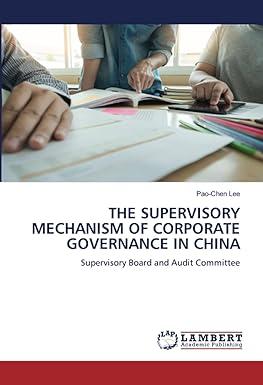Answered step by step
Verified Expert Solution
Question
1 Approved Answer
1) Resch v. Canadian Tire Corporation, 2006 CanLIl 11930 (ON SC), 17 BLR (4th) 301 [Note: Your instructor may assign this case as a Shared
1) Resch v. Canadian Tire Corporation, 2006 CanLIl
11930 (ON SC), 17 BLR (4th) 301
[Note: Your instructor may assign this case as a Shared Writing activity.]
Resch purchased a bicycle for his stepson from a Canadian Tire dealership owned by Mills-Roy Enterprises Ltd. Because of a defective fork on the bike, the stepson was seriously injured in an accident, and he and his family brought this action against Canadian Tire, Mills-Roy (the dealership), and Procycle Group Inc. (the manufacturer).
Explain what course of action the various parties would have against each of the defendants and any arguments that could be raised in their defence.
Explain the likely outcome. Would it make any difference to your answer to know that the stepson paid some funds toward the purchase of the bike?
Analyse the case
For each case include :
a. What is the background of the case?
b. What are the facts of the case?
c. Identify the legislations related to the case.
d. What is the legal question in the case?
e. What reasoning supports your decision? And why?
5. Write a one-page summary for each case.
2) Behiel v. Primco Limited, 2011 SKQB 65 (CanLIl)
When the Behiels bought flooring from Primco they informed the salesman, Lee, that they had young children and needed a product that would resist scratching, be durable, and be pleasing to the eye. He recommended the product ultimately purchased, stating it would meet or exceed those requirements. In fact, the floor was seriously scratched when furniture was moved on it. The Behiels complained and, when the supplier and manufacturer would do nothing, brought this action.
Assuming there was a restrictive covenant included prohibiting recovery for this type of damage, what would be the likelihood of success of this action?
Note that this action was brought in Saskatchewan where there is a Sale of
Goods Act and a Consumer Protection Act in place.
Analyse the case
For each case include :
a. What is the background of the case?
b. What are the facts of the case?
c. Identify the legislations related to the case.
d. What is the legal question in the case?
e. What reasoning supports your decision? And why?
5. Write a one-page summary for each case.
Step by Step Solution
There are 3 Steps involved in it
Step: 1

Get Instant Access to Expert-Tailored Solutions
See step-by-step solutions with expert insights and AI powered tools for academic success
Step: 2

Step: 3

Ace Your Homework with AI
Get the answers you need in no time with our AI-driven, step-by-step assistance
Get Started


